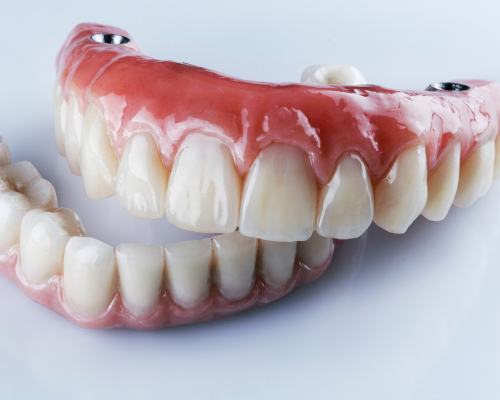I’ve spent the last ten years chasing floating dentures and trying more brands of adhesives than I can count. I am increasingly nervous about socializing because my denture falls out without warning. Are dental implants the only way to keep a denture in place? What are my alternatives? – thank you. Thomas N. from Austin
Thomas,
Many people share your concerns about dentures. We will explain why dentures float and what you can do about it.
Why Do Dentures Float?
A denture may float due to poor fit, the age of the denture, and bone shrinkage.
- Poor fit – A well-designed denture provides the best fit possible. This requires accurate impressions of your mouth, high-quality denture material, and proper lining. If a dentist overlooks any of these details, your dentures will fit poorly eventually and are more likely to float around in your mouth.
- Old dentures – How old are your dentures? Depending on your dentures’ quality, they should last at least five years. However, dentures must be maintained or regularly relined to prevent premature loosening. If you’ve had your dentures for years and years, it is probably time for a new set.
- Bone shrinkage – When all your teeth are missing, your jawbone shrinks. That’s because tooth roots stimulate bone and keep it intact. Over the years, your jawbone will progressively shrink. As your jawbone shrinks, your dentures will float in your mouth.
How Can You Stop a Denture from Floating?
You can stop dentures from floating with dental implants. However, if you cannot afford implant dentures, you can minimize the floating by getting quality denture materials and a denture that fits well from a prosthodontist, a tooth replacement and restoration specialist. Still, as you continue to wear dentures, your jawbone will shrink over the years, increasing the challenge of getting dentures that fit well. A prosthodontist or implant dentist will recommend dental implants.
How Do Dental Implants Stop a Denture from Floating?

Dental implants support a palateless denture and increase your comfort
Dental implants stop a denture from floating in the following ways.
- Dental implants fuse with your jawbone. Dental implants are titanium or zirconia replacement tooth roots. A prosthodontist or oral surgeon surgically places the implant screws in your jawbone. Three to four months after surgery, your jawbone and implants will fuse, providing a solid anchor for your dentures and preventing it from floating in your mouth.
- The denture base attaches to the dental implants. A prosthodontist can make a custom denture that snaps or screw onto dental implants. Your dentures will be secure, making it impossible for them to float in your mouth.
- Dental implants stimulate your jawbone. Dental implants stimulate your jawbone like tooth roots. Although you can get as few as two implants, more implants will stimulate a wider area of the bone. Your jawbone will continue to support your facial muscles and prevent premature facial sagging. If you have experienced jawbone shrinkage, you may need a bone graft before dental implants.
Successful dental implant placement and denture fit depend on the skill of the dentist or prosthodontist (denture specialist). A specialist or dentist with post-graduate training will ensure you get high-quality implants and dentures. Your palateless denture will be more comfortable and improve your ability to taste food while eating.
Schedule consultations with at least two implant dentists or prosthodontists to discuss your options.
San Antonio dentists Dr. Gilberto Tostado and Dr. Karina Acuña sponsor this post.


